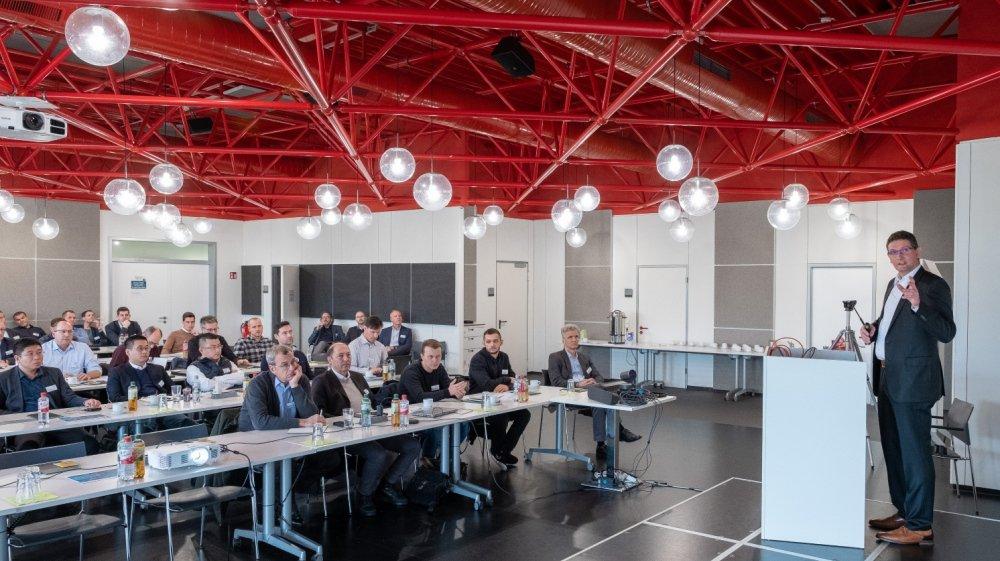The 16th Users Conference on Biaxial Fatigue Testing with scientists, manufacturers of passenger cars and commercial vehicles as well as suppliers was dedicated to various anniversaries. The biennial user conference itself has been in existence for 30 years now. Furthermore, the organizing Fraunhofer LBF celebrated its 85th anniversary in 2023, and the ZWARP technology has been around for over 40 years.
New findings of multiple impact factors for BiAx wheel testing
The international meeting, organized by the Fraunhofer–scientists, is known as a forum to discuss new developments in the market for testing and validation technologies with industry experts. Due to the different anniversaries and the missed conference two years ago due to Corona, this year’s conference was a good occasion to meet by a face-to-face meeting for exchange of ideas concerning several questions: In which direction will the technology and the conference develop, what are the future requirements of this technology and why is it beneficial to further develop the biaxial fatigue tests after so many years of application? An active discussion among the participants, guest contributions from partners who had only recently begun to use the ZWARP technology and from partners who have been using it since its introduction provided the required answers. A contribution on the impact factors of load files such as wheel size, wheel design, tires, vehicle application and vehicle usage arouse particular interest. The discussion of the general development of the conference gave fruitful feedback and other forms like workshops and online forum were suggested. A community wide committee is planned to prepare the next conference.
ZWARP technology: efficient wheel development for more than 40 years
The Fraunhofer LBF is considered as the pioneer in the multi-axial life cycle testing of vehicle wheels and wheel hubs. In 1982, scientists at the institute put the biaxial wheel/hub test rig (ZWARP) into operation for the first time. At that time, it was a novel device for examining vehicle wheels under biaxial load. In 1982 a patent for road vehicles and in 1987 a patent for rail vehicles were filed and these technologies were subsequently sold under license to customers. At www.zwarp.fraunhofer.de/en.html Fraunhofer LBF created a website with in-depth information about biaxial wheel/hub testing (ZWARP). Today, wheel road simulators of this type are used on a worldwide basis to shorten development times in the automotive industry and to test safety components such as wheels and wheel hubs.
Fraunhofer LBF in Darmstadt has stood for the safety and reliability of lightweight structures for more than 80 years. Today, with its expertise in the areas of structural durability, system reliability, vibration technology and polymer technology, the Institute provides solutions for three of the most important cross-cutting issues of the future: lightweight design, functional integration and cyberphysical mechanical engineering systems. The focus here is on solutions to social challenges such as resource efficiency and emission reduction as well as future mobility, like emobility and autonomous, networked driving. Comprehensive skills ranging from data acquisition in real operational field use to data analysis and data interpretation, in addition to deriving specific measures to design and improve material, component and system properties form the basis for this. Customers come from automotive and commercial vehicle construction, railway transport engineering, shipbuilding, aviation, machine and plant construction, power engineering, electrical engineering, medical engineering, and the chemical industry. They benefit from the proven expertise of 400 employees and cutting-edge technology accommodated in more than 17,900 square meters of laboratory and experimental space.
Fraunhofer Institut LBF
Bartningstr. 47
64289 Darmstadt
Telefon: +49 (6151) 705-287
http://www.fraunhofer.de
Presse und Öffentlichkeitsarbeit
Telefon: +49 (6151) 705-268
Fax: +49 (6151) 705-214
E-Mail: anke.zeidler-finsel@lbf.fraunhofer.de
![]()

